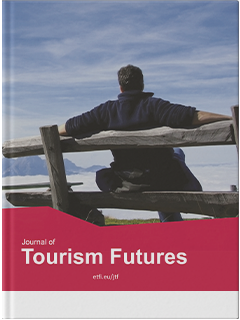Regenerative tourism: the challenge of transformational leadership
IF 5.8
Q1 HOSPITALITY, LEISURE, SPORT & TOURISM
引用次数: 6
Abstract
PurposeThe aims of this paper are to share how one cohort of tourism practitioners viewed the transformative change needed within the tourism industry and to explore the implications for leadership in the future.Design/methodology/approachThe research design is based on a virtual whiteboard brainstorming activity incorporating both the individual and collective thinking of 20 participants in a global cohort class. Using conversational techniques to elicit cognitive knowledge and felt experience, the methodology generates shared understandings about the opportunities and challenges of implementing regenerative tourism.FindingsThe conversations reported in the findings of this paper provide important insights into the challenges and opportunities faced by tourism professionals as enablers of regenerative tourism. Findings included, first, that participants within the course demonstrated characteristics of transformational leadership including a strong moral positioning, embodied self-awareness, collaboration and collective action. Second, specific points of inertia that impede regenerative tourism are identified including embedded culture, power and organisational structures. Third, professionals are calling for practical tools, new frames of reference, and examples to help communicate regenerative tourism.Research limitations/implicationsThis is a viewpoint, not a research paper. Nonetheless, it provides a rich vein of future research in terms of disruptive pedagogy, potentially gendered interest in regenerative tourism, issues of transforming the next generation and power.Practical implicationsGovernance, organisational, destination management strategies, planning and policy frameworks, individual issues as well as contradictions within the tourism system were revealed. Transformative change in an uncertain future requires transformational leadership, characterised by moral character and behaviours that trigger empowered responses.Originality/valueThis paper shares insights from a unique global cohort class of tourism professionals wherein the challenges and opportunities for regenerative tourism are identified. The methodology is unusual in that it incorporates both individual and collective thinking through which shared understandings emerge.再生旅游业:转型领导的挑战
本文的目的是分享一群旅游从业者如何看待旅游业所需的变革,并探讨未来领导力的影响。设计/方法/方法研究设计基于一个虚拟的白板头脑风暴活动,该活动结合了全球队列班20名参与者的个人和集体思维。使用对话技巧引出认知知识和感受经验,该方法产生关于实施再生旅游的机遇和挑战的共同理解。研究结果本文的研究结果中报告的对话为旅游业专业人士作为再生旅游的推动者所面临的挑战和机遇提供了重要的见解。研究结果包括,首先,课程参与者表现出变革型领导的特点,包括强烈的道德定位、具体的自我意识、合作和集体行动。其次,确定了阻碍再生旅游的具体惯性点,包括内在文化、权力和组织结构。第三,专业人士呼吁提供实用工具、新的参考框架和例子,以帮助宣传再生旅游。研究局限/启示这是一个观点,而不是一篇研究论文。尽管如此,它为未来的研究提供了丰富的脉络,包括颠覆性教学法、对再生旅游的潜在性别兴趣、改变下一代和权力的问题。实际意义揭示了治理、组织、目的地管理策略、规划和政策框架、个别问题以及旅游系统内的矛盾。在不确定的未来中,变革需要变革型领导,其特点是道德品质和引发授权反应的行为。原创性/价值本文分享了一个独特的全球旅游专业人士群体的见解,其中确定了再生旅游的挑战和机遇。这种方法的不同寻常之处在于,它结合了个人和集体的思考,从而产生了共同的理解。
本文章由计算机程序翻译,如有差异,请以英文原文为准。
求助全文
约1分钟内获得全文
求助全文
来源期刊

Journal of Tourism Futures
HOSPITALITY, LEISURE, SPORT & TOURISM-
CiteScore
15.70
自引率
6.00%
发文量
64
审稿时长
34 weeks
期刊介绍:
 求助内容:
求助内容: 应助结果提醒方式:
应助结果提醒方式:


